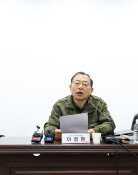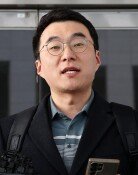The Opposition`s Notion of `Oppression`
The Opposition`s Notion of `Oppression`
Posted February. 22, 2010 08:55,
The progressive Democratic Labor Party held a rally at Seoul City Plaza Saturday to condemn the Lee Myung-bak administration over a police probe into public school teachers and civil servants joining in the party and payment of party membership fees. Five other opposition parties, including the main opposition Democratic Party, also took part in the rally as well as civic and social groups such as the Korea Confederation of Trade Unions. Citizens and the media showed a lukewarm response to the event, however. The organizers claimed that more than 2,000 people took part, but police estimated the number at 700. Even online media, which is generally supportive of the opposition camp, did not consider the rally as major news.
Rally participants, including Democratic Party Chairman Chung Sye-kyun and Democratic Labor Party Chairman Kang Ki-kap, labeled the police investigation as oppression of opposition parties. Such an accusation is always made whenever the opposition is probed. When former President Roh Moo-hyun committed suicide amid a criminal investigation into corruption, opposition parties unanimously warned of a crisis in democracy. Even when Kim Min-seok, a former member of the Democratic Partys supreme council, was investigated over his alleged amassing of illegal political funds, the leaders of the Democratic, Democratic Labor and Creative Korea parties accused the administration of oppressing democracy and oppressing opposition parties. Regardless of whether corruption existed or not, they blindly label such investigations as oppression or non-oppression depending on who was probed.
Police say 286 members of the Korea Teachers and Educational Workers Union and the Korea Government Employees Union are suspected of paying membership fees to the Democratic Labor Party, with 120 members signing up on the partys voting site. A record suggests that the teachers union leadership ordered the expansion of Democratic Labor Party members in the 2007 presidential election. The party is also found to have appointed leaders of the teachers and civil servants unions to its central committee and council. It is suspected of running an unregistered bank account and obstructing a police search-and-seizure operation. The party has committed a flurry of illegal acts but insists that authorities should not investigate opposition parties no matter what.
Imagine the opposite situation. Suppose the teachers and civil servants unions systematically colluded with the ruling Grand National Party, joined the party, and paid membership fees. Opposition parties would rise up in arms to condemn such an act. A decade has passed since the labor party became an official political party. It is about time the party knew the basics of rule of law. The Democratic Party is the main opposition party and enjoyed power for 10 years. If its leader takes to the streets with the Democratic Labor Party, whose leader has a record of using violence at the National Assembly and instigating illegal strikes, how can the Democratic Party appease the people and earn public trust?
Editorial Writer Lee Jin-nyong (jinnyong@donga.com)







